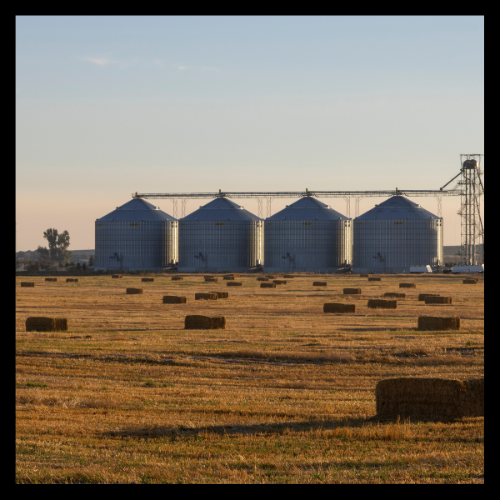Grain bin fumigation is a critical process designed to eliminate pests that infest stored grains. This meticulous procedure involves sealing grain bins and introducing fumigants that permeate the storage space, effectively exterminating insects and other pests. In the realm of agriculture, this practice holds paramount importance as it ensures the preservation of grain quality and prevents significant economic losses. The process is a detailed operation that requires professional expertise to guarantee safety and efficacy.
Counting The Cost
Choosing professional fumigation services brings a multitude of benefits. Professionals possess the necessary knowledge to handle fumigants responsibly and effectively, ensuring that the entire bin is treated without leaving pockets of infestation. Agricole Wildlife Solutions is dedicated to maintaining high standards of quality and safety. With a team of experienced professionals, we provide comprehensive services that protect your product from pests. Our commitment to excellence ensures that our clients receive top-notch service, safeguarding their agricultural investments.
Pests can cause devastating financial losses in the agricultural sector. According to the USDA, pests account for about $70 billion dollars in agriculture losses globally each year, making pest control an essential aspect of storage management. Stored grain losses by pests are often greater than crop losses. Without effective fumigation, these losses can escalate, affecting the profitability of farmers and storage facilities.
Grain plays an important role in the economy, serving as a staple food source and a key export product. The long-term impact of pest infestations includes not only immediate financial losses but also potential damage to market reputation and loss of business. Farms and storage facilities that invest in professional fumigation experience significant reductions in losses, maintaining higher quality product and achieving better market prices.
Identifying The Invaders
Idaho faces invasion from several common pests, each with its unique characteristics and impact. Identifying these pests is important for effective pest management. The top five pests that pose a threat are the grain beetle, Indian meal moth, lesser grain borer, rice weevil, and red flour beetle.
- The grain beetle is a small, reddish-brown insect that thrives in stored grains. These beetles have a short lifecycle, reproducing rapidly under optimal conditions. They are most attracted to crops such as wheat and barley. Their presence can lead to significant economic losses due to their feeding habits and contamination.
- Indian meal moths are known for their distinctive wing patterns and their ability to infest a wide range of product. These moths lay eggs and the larvae create webbing as they feed, contaminating large quantities of stored produce. They are particularly attracted to corn and wheat.
- The lesser grain borer is a destructive pest that bores into grains, reducing them to dust. This pest has a high reproduction rate, making it a formidable threat to stored product such as corn and rice. Effective fumigation is essential to control their population and prevent widespread damage.
- Rice weevils are small, reddish-brown insects with a distinctive snout. They are notorious for their ability to chew through kernels, leading to significant losses. These weevils are particularly attracted to rice and other cereals, and their presence can severely impact quality and marketability.
- Red flour beetles are a common pest in processed grains, such as flour and cereal products. They are small, reddish-brown beetles that can quickly infest storage facilities. Their rapid reproduction and ability to thrive in processed products make them a significant pest that requires effective management.
DIY Dangers
Attempting bin fumigation as a DIY project poses numerous risks. Exposure to fumigants can lead to serious health issues, including respiratory problems. Proper protective equipment is essential, and without it, individuals are at a high risk of health hazards. Inadequate pest eradication is another major concern. Without professional expertise, it is challenging to ensure that all pests are effectively eliminated. This can lead to pest resistance, making future infestations harder to control. Professionals, on the other hand, guarantee thorough pest eradication, ensuring the safety and quality of the product.
Legal and safety concerns also make DIY fumigation a risky endeavor. There are strict regulations governing the use of fumigants, and non-compliance can lead to legal issues. Additionally, improper handling of fumigants can result in accidental contamination, posing risks to both humans and animals. Professionals ensure compliance with regulations and provide comprehensive insurance coverage, mitigating liability and ensuring peace of mind for storage facility owners.
By investing in professional services, farmers and storage facilities can safeguard their investments, ensure quality, and achieve long-term economic benefits. Agricole Wildlife Solutions is committed to providing top-notch fumigation services, ensuring the efficacy of the process. With our expertise and dedication to quality, we help protect your grain from pests, ensuring a better return on your investment. Contact us today for more information.
Frequently Asked Questions About Grain Bin Fumigation
Q1. Can grain bin fumigation affect the taste or nutritional value of my grain?
A1. When conducted professionally, the service is designed to target pests without altering the taste or nutritional content. The fumigants used are carefully chosen for their efficacy against pests and their inability to penetrate the grain's surface. This means your product remains as nutritious and palatable as before, ensuring it meets market standards and consumer expectations.
Q2. Can extreme weather conditions impact the effectiveness of fumigation?
A2. Extremely cold or hot temperatures can affect the fumigant's ability to disperse. Professional services account for these variables, often scheduling treatments during optimal weather conditions to ensure maximum efficacy.
Q3. Are there unusual pests that might invade the bins that people don't often consider?
A3. Yes, apart from the common pests, some unusual invaders include psocids (booklice) and certain types of mites. These pests thrive in high humidity environments and can go unnoticed until they have caused significant damage. Regular inspections and fumigation are essential to identify and eliminate these less common threats.


